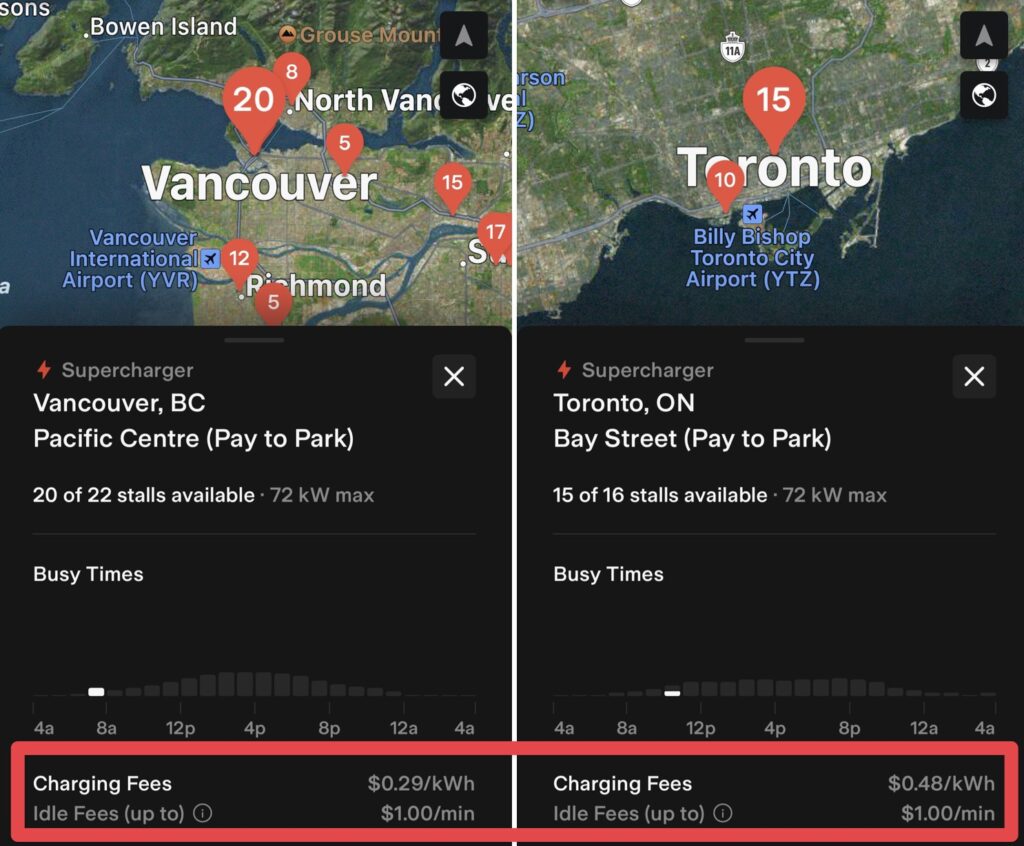
Tesla Supercharging in Canada Now Billed in kWh

Tesla has made major changes to its Supercharging in Canada, as billing now takes place in kWh instead of billing by the minute.
Numerous Tesla owners spotted the change that took place on Thursday morning on X and Reddit. Tesla North can confirm the change has taken place as the Tesla app is showing charging fees billed in kWh, with locations such as Vancouver in B.C. showing $0.29/kWh and Toronto, Ontario at $0.48/kWh, depending on location.
These rates in the Lower Mainland are likely some of the cheapest Supercharging rates in North America.
Great news: @Tesla now charges per kWh in Canada🇨🇦
Only CAD 0.47 or 0.48 per kWh, at your close @TeslaCharging station, in any charging speed! #tesla #supercharge pic.twitter.com/disfvnYYrk— Emiliano – Vou de Tesla 🇧🇷🇮🇹🇨🇦🚗⚡️🔋☀️ (@voudetesla) August 3, 2023
“Whenever possible, owners are billed per kWh (kilowatt-hour); in other areas, owners are billed per minute,” says Tesla website. Gone are the billing per minute tiers to account for changes in charging speeds: ‘Tier 1,’ ‘Tier 2,’ ‘Tier 3’ and ‘Tier 4.’
It seems Vancouver has some of the cheaper rates versus the rest of the country from our checks of Supercharger locations.
“Canada requires charging by the minute vs kWh. We’re working to get that changed,” said Tesla CEO Elon Musk in March of 2022.
Measurement Canada eventually approved all fast-charging networks such as Tesla to charge customers by the amount of electricity used instead of time spent at a charger, earlier this year and now we’re seeing the change. There’s no doubt Tesla had a major hand in this modification of the law, as the company’s cars are driving up iZEV federal rebates to record highs, which will make the federal government happy in its mission to shift all vehicles to clean energy.
Canada requires charging by the minute vs kWh. We’re working to get that changed.
— Elon Musk (@elonmusk) March 30, 2022
Measurement Canada introduced new regulations in February 2023 governing the billing of public charging stations. This significant change is set to make charging an EV’s battery a more equitable process across the board.
Under the previous system, EV drivers were billed for the time they spent plugged into a charging station, regardless of the amount of energy consumed. This approach was disadvantageous for drivers of slower-charging vehicles, who would pay the same amount as those with faster-charging cars but receive less electricity in return.
Announced in late 2022 and to be implemented over the next 18 months, the new regulations will address this disparity. Under the oversight of Measurement Canada, guided by the Electricity and Gas Inspection Act, charging stations will now be able to bill customers based on the actual amount of charge their vehicles receive, measured in kilowatt-hours (kWh).
This reform represents a more balanced approach, as it takes into consideration the different charging capacities of various EVs. Finally, we’re seeing kWh billing come to Tesla Superchargers in Canada.
